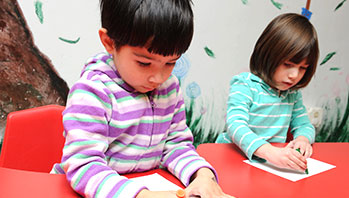- books
- friend
MA Standards:
Foundational Skills/RF.PK.MA.1: With guidance and support, demonstrate understanding of the organization and basic features of printed and written text: books, words, letters, and the alphabet.
Foundational Skills/RF.PK.MA.1a: Handle books respectfully and appropriately, holding them right-side-up and turning pages one at a time from front to back.
Speaking and Listening/SL.PK.MA.1a: Observe and use appropriate ways of interacting in a group.
Speaking and Listening/SL.PK.MA.3: Ask and answer questions in order to seek help, get information, or clarify something that is not understood.
Speaking and Listening/SL.PK.MA.6: Speak audibly and express thoughts, feelings, and ideas.
Head Start Outcomes:
Social Emotional Development/Social Relationships: Uses socially appropriate behavior with peers and adults, such as helping, sharing, and taking turns.
Literacy Knowledge/Early Writing: Recognizes that writing is a way of communicating for a variety of purposes, such as giving information, sharing stories, or giving an opinion.
PreK Learning Guidelines:
Health Education 19: Practice independence and self-help skills.
English Language Arts/Language 1: Observe and use appropriate ways of interacting in a group (taking turns in talking; listening to peers; waiting until someone is finished; asking questions and waiting for an answer; gaining the floor in appropriate ways).
English Language Arts/Language 2: Participate actively in discussions, listen to the ideas of others, and ask and answer relevant questions.
Draw and Write Together: Taking Care of Books

© Commonwealth of Massachusetts, Department of Early Education and Care (Jennifer Waddell photographer). All rights reserved.
Have a number of books on display and discuss how to care for them.
Tell children how important it is to take care of books so everyone can enjoy them. Then discuss different ways children can take care of books.
Make a list on chart paper with children titled, “How We Take Care of Our Books.” Ask questions to help children think about different ways to take care of the books in their room. For example,
- What can you do if someone leaves a book on the floor where it might get stepped on?
- What can you do with the book when you have finished reading a book?
- What can you do if someone is reading the book you want to read?
Have children act out their responses as you record them on the chart. Add your own recommendations.
Read the completed chart out loud. Allow time for children to draw pictures to help illustrate the rules so they can “read” the chart on their own. Display the chart in the Library Center.
Social Emotional Tip: Encourage children to think about how it is important to respect each other’s things. Talk with children about how respecting each other’s things is an important part of being a good friend. Say, It’s important to take care of things that are ours, but it is just as important to take care of things that don’t belong to us. This is one way we can be the best friends we can be!
